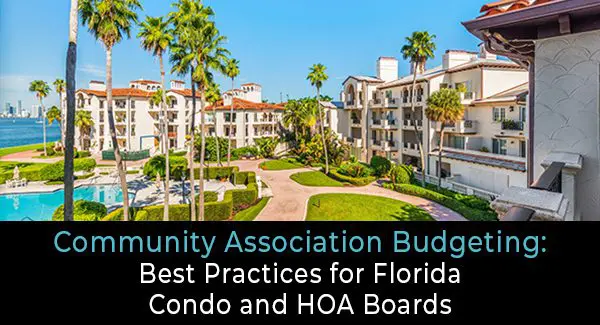- Community Associations
- Florida
For Florida community associations, effective budget planning is more than just balancing numbers. Budgeting is a legal requirement and a safeguard for the long-term financial health of your community. Board members and property managers must take a proactive, informed approach — especially with evolving state laws, rising insurance costs, and the growing importance of properly funded reserves.
Here are several best practices to help your Florida condo or HOA board plan, prepare, and evaluate your annual budget with confidence.
- Understand Florida’s Legal Requirements
Florida law mandates specific budgeting practices for associations, especially regarding reserves. For example:
- Condominiums must present a proposed annual budget that includes fully funded reserves for roof replacement, building painting, pavement resurfacing, and any component costing $25,000 or more. Owners may vote to waive or reduce reserves, but recent legislation has limited that flexibility.
- Homeowners’ Associations have more discretion but must still follow their governing documents and provide proper notice of budget meetings.
Consult your association’s attorney and accountant each budget season to ensure compliance.
- Start the Budget Process Early
Begin budgeting several months before the new fiscal year. Early planning helps avoid rushed decisions or special assessments. This allows time to:
- Review current and historical expenses
- Gather vendor and insurance quotes
- Account for inflation and cost increases
- Solicit input from committees or residents
- Focus on Accurate Reserve Funding
Legislation following the Surfside condo tragedy emphasized the importance of reserves. Associations can no longer rely on waiving or underfunding reserves long term.
Conduct reserve studies regularly to determine remaining useful life and replacement costs of major components. Ensure the reserve schedule is realistic and funded based on actual needs, not just to keep assessments low. Inadequate reserves may affect property values and expose boards to liability.
- Account for Rising Insurance
Insurance premiums have surged in Florida due to hurricanes and litigation. Associations must budget accordingly. Work with your insurance broker early to secure quotes and explore options like umbrella or windstorm policies. Also budget for deductibles, especially in flood or high-risk zones.
- Factor in Preventative Maintenance and Vendor Costs
Regular maintenance helps avoid costly repairs. Budgeting for routine services (ex. landscaping, elevator maintenance, pool upkeep, pest control) supports long-term savings and community upkeep.
Also consider vendor contracts up for renewal, rising labor/material costs, and hurricane preparations (ex. tree trimming, generator maintenance).
- Provide Transparency and Communicate Clearly
Budget meetings must be properly noticed and owners must receive copies of the proposed budget. Be prepared to explain why assessments are increasing (if applicable), how reserve funding decisions were made, and what major projects are anticipated. Clear communication builds trust and reduces confusion or disputes.
Legal Resource
Florida associations face unique challenges, from severe weather to evolving legal requirements. Boards and managers who plan ahead and stay informed are best positioned to protect their community’s financial health. Consult your association attorney during budget season to ensure compliance with Florida law and your governing documents.
Do not hesitate to contact our law firm if your association has questions regarding the budget planning process, assessment changes, correct notice timelines, budget approval meetings, or other legal concerns.
Please call 855-537-0500 or visit www.ksnlaw.com.
Since 1983, KSN has been a legal resource for condominium, homeowner, and townhome associations. Additionally, we represent clients in real estate transactions, collections, landlord/tenant issues, and property tax appeals. We represent thousands of clients and community associations throughout the US with offices in several states including Florida, Illinois, Indiana, and Wisconsin.
Please note the material contained in this article is for educational and informational purposes only and does not constitute legal advice. No attorney-client relationship is established by your review or receipt of the information contained in this article. You should not act on the information discussed in this article without first obtaining legal advice from an attorney duly licensed to practice law in your State. While KSN has made every effort to include up-to-date information in this article, the law can change quickly. Accordingly, please understand that information discussed in this article may not yet reflect the most recent legal developments. Material is not guaranteed to be correct, complete, or up to date. KSN reserves the right to revise or update the information and statements of law discussed in the article law at any time, without notice, and disclaims any liability for your use of information or statements of law discussed on the article, or the accessibility of the article generally. This article may be considered advertising in some jurisdictions under applicable law/s and/or ethical rules/regulations. © 2025 Kovitz Shifrin Nesbit, A Professional Corporation.


